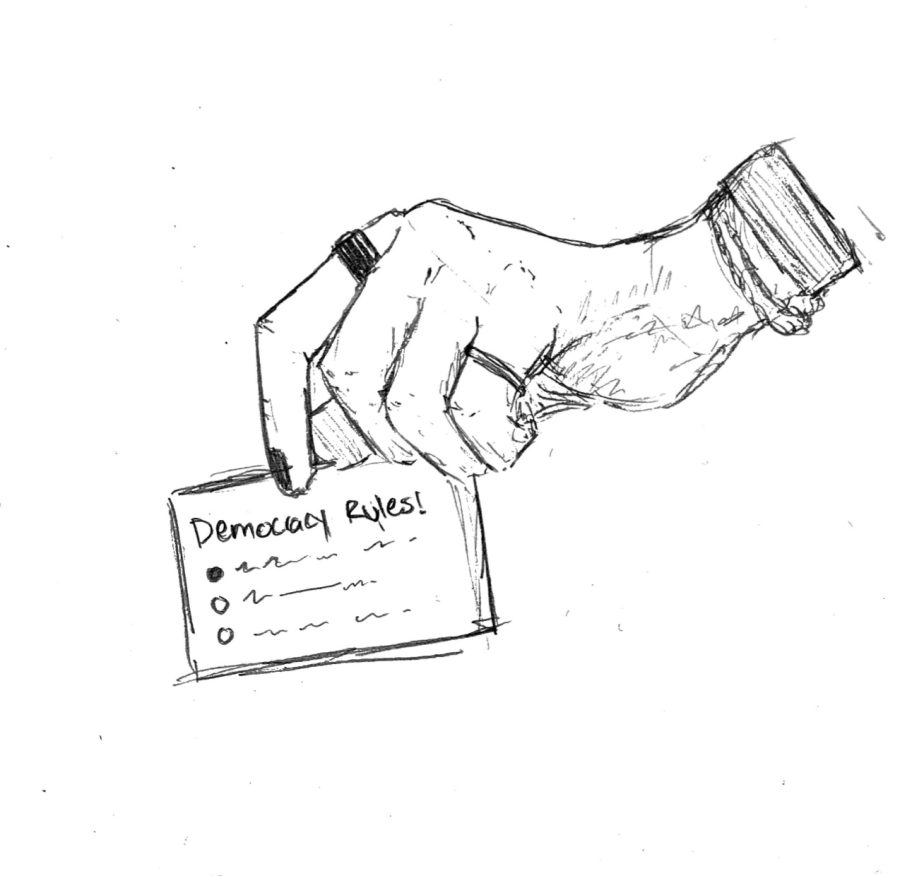Should the Brooklyn Tech SGO be Democratically Elected?
“For the people, by the people”?
Drawing by Daisy Shelton (’24)
Brooklyn Tech students in favor of democracy cannot seem to catch a break- or a ballot.
November 12, 2021
In one of the most well-known specialized high schools in New York City, the Brooklyn Tech Student Government Organization (SGO) is not directly democratically elected – a devastating flaw in our student-run political system. 12 out of the 20 members of the Executive Council are not directly elected by the student body.
Every year when I was eleven, twelve, thirteen, I entered my middle school auditorium packed with students, watching my peers deliver their speeches, while we frantically scribbled notes on each candidate in our notebooks. Being a teenager means often feeling disempowered, but having a chance to vote lets students feel they have a say in what happens to them. I experienced this only during those election days.
In contrast, the Tech SGO is largely removed from the majority of the student body. Its secrecy might be part of the problem. The SGO follows a designated structure, beginning with Student Leadership. According to Ms. O’Neal, COSA to the ‘22 and ‘24 classes and co-supervisor of Student Leadership, says that Student Leadership is “an extension of the SGO… [and] the worker bees behind the Student Government.” It is an elective-class, where they are separated to work in various committees and are chosen through interview by the faculty advisors. Next are the class presidents and vice presidents, who bring to light the issues of their individual grade. Finally, there is the Executive Council made up of upperclassmen, including the SGO president, vice-president, secretary, treasurer, and parliamentarians.
“If SGO members or people within the different classes were to say they have concerns, the Executive Council would be the ones to bring that up with the administration,” Ms. O’Neal commented. This illustrates one of the main challenges with the unelected Executive Council: the entire student body cannot wholly decide which Executive Council candidate’s policies they want to be brought up to the administration. The students are uninvolved in the policies that govern student life and speak to the administration.
A system that lacks student interaction inevitably makes the SGO seem accountable to the teachers, not to the student body. “[The SGO] have no real power,” William Chapman ‘24 claimed. “They just listen to what the officials, like Mr. Newman, tell them to do.” Voting complacency in other aspects, as with class presidents and class vice presidents, might be rising because they feel that it won’t accomplish anything, since administrators will always run the show. If candidates are picked and surrounded by excitement in the eyes of the student body, they will feel more invested.
However, it has not always been the case that the SGO was not directly elected. The current president of the SGO, Samuel Greenberg ‘22, provided some perspective. “It all comes down to history. In the past, all SGO positions used to be elected. This includes the secretary, the treasurer, and the parliamentarians. In addition to, of course, the class presidents and class vice presidents,” he said. The switch, it seems, comes down to voter turnout. “You had a huge number of students voting for the class presidents, class vice presidents, the president, and the vice president of the SGO,” Greenberg said of the big-ticket items, “But only a tiny fraction of that was voting for the secretary, the treasurer, and the parliamentarians.” A solution was eventually made, which limited voting to a smaller election committee that is made up of a random group of students and some advising COSAs– like Ms. O’Neal.
This does not mean that the SGO has been ineffectual. “I know that someone else brought up the elevators, and said that students were complaining that they had so many stairs to go up to get to the ninth floor. The vice-president, Jediah Tomas ‘23, brought this issue to the principal, which led to the principal allowing students to take the elevator for orchestra,” Ms. O’Neal added. If the issues are getting solved by the SGO regardless, does it truly matter if they were elected to get there?
It still does. Even if issues are getting resolved, the student body, who are not already involved in the SGO or Student Leadership, are generally unaware of this progress. A feasible solution would be to have a general analysis of the SGO discussions and progress in the daily newsletter, which is sent out by Ms. O’Neal.
Samuel Greenberg and the rest of his government’s uninvolvement with the student body has its clear consequences. “In elections, especially with high schools, it is really just a popularity contest,” he defends. “Whether you look at our school, or the country as a whole. Whoever is the most popular, is the one who’s elected, and that has its upsides, and it has its downsides.” However, that is the undisputed catch of democracy. A case can be made against “likeability” politics, but the value of likeability is a side effect of electing a person who truly represents the people. The numerous benefits of a democratic electoral system outweigh these costs. In a specialized high school ranked number two in the state, we should be able to trust our students to elect the right people for the jobs.
An election at Brooklyn Tech could entail a few debates between candidates for each role, leading up to the final speech on election day. Elections could be held through a Google form emailed to students’ BTHS emails, making it extremely easy and accessible to a wide variety of students. The excitment from September to October would be palpable. There would be posters hung up on hallways, button-wearing students walking to classes, canvassing students running frantically throughout the cafeteria. I cast my votes in middle school, and it felt like I was a part of something. At Tech, with a student body of over 6,000 students, it is difficult to feel like one has a voice. Being able to have a vote means that you are being heard – not just counted.







































